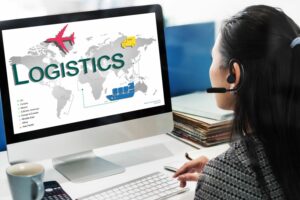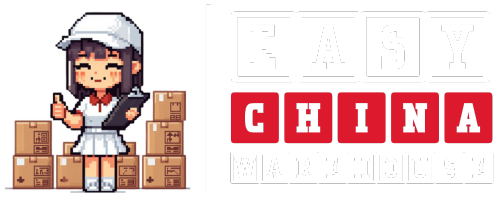Login

Have you ever considered starting an online business, but felt overwhelmed by the intricacies of e-commerce logistics?
Embarking on an e-commerce journey can be daunting, with tasks ranging from website setup to inventory management. The triumph of any business hinges on its ability to operate efficiently while managing costs wisely. Effective logistics solutions are paramount for businesses looking to increase efficiency, streamline operations, and reduce costs.
A judicious approach to e-commerce logistics optimization can make your business more efficient, more economical, and better able to serve your customers. This article explores 4 most important logistics strategies to help your ecommerce business thrive.
Understanding e-commerce logistics and its role in the sales process
A critical factor in running a thriving online business is understanding e-commerce logistics and its profound impact on the entire business process. E-commerce logistics orchestrates the delivery of goods from sellers to customers with utmost efficiency. It involves a holistic system of transportation, warehousing, and inventory management that facilitates fast and efficient product delivery.
Components of e-commerce logistics include packaging, labeling, shipping, tracking, and returns, and include a robust customer service aspect to manage expectations and ensure timely, accurate communication – a critical aspect of successful product delivery.
More broadly, logistics optimization involves more skillfully managing the flow of goods between suppliers, warehouses, stores, customers, and other stakeholders to ensure timely deliveries at acceptable costs.
To be truly effective, e-commerce logistics requires an integrated approach that seamlessly links the various stages of the supply chain-from manufacturers to warehouses to delivery providers-into a cohesive system. This integration ensures the proper handling, storage, tracking, and delivery of all shipped products.
Advanced logistics management systems further streamline the entire process and provide valuable insight into the performance of each supply chain component. With an optimized logistics system in place, e-commerce companies can increase operational efficiency and provide superior service to customers.
The Fundamental Components of E-commerce Logistics
Key components of e-commerce logistics encompass inventory management, order fulfillment, warehousing, and returns management.
These components serve as the backbone for ensuring that customers receive their orders swiftly and accurately.
Inventory management guarantees the availability of the right products in stock when customers are ready to make a purchase.
Order fulfillment involves the meticulous process of packaging and shipping orders to customers, while warehousing stores products until they are prepared for dispatch.
Returns management is equally critical, ensuring the efficient handling of products slated for return. Effective utilization of these components is imperative for ensuring customer satisfaction and the sustained success of e-commerce ventures.

E-commerce logistics optimization ways
- Make sure to forecast inventory needs
a) Determine lead time by calculating how much time it takes your team to fill an order once it has been received. Assess the data from the last four to six order periods to get an average lead time for your organization.
b) Look at past sales records and analyze the data to identify sales trends. Look specifically at which products you sell the most of and when customers are most likely to buy them.
c) Use the trends and past sales numbers to determine how much inventory you need to keep on hand to fill your average daily orders.
- Try different shipping methods
Learn what method works best for your products and your company. The cheapest method may end up costing you more due to extensive lead times, or you may realize you don’t need the fastest method. Shipping with a faster more expensive shipping line can help reduce cash flow requirements for inventory heavy businesses by bringing the produced goods to your end customer faster.
- Outsource Your E-commerce Logistics
Third-party logistics (3PL) sees businesses outsource their logistics to a dedicated logistics company. Relying on a 3PL partner comes with its own benefits, including handling all of the essential and stressful logistics steps that take your time away, such as planning delivery routes. Many 3PLs offer customizable and scalable service options, which means that you only pay for the services that you need.
Typically a 3PL’s scale can provide a lower cost shipping solution than you can provide by managing your own shipping. In this scenario a 3PL will save your company time and money when compared to doing the work on your own.
Selecting the right e-commerce logistics partner is pivotal for the success of your business. A partner attuned to your specific needs, capable of providing comprehensive solutions covering shipping, warehousing, distribution, and customer service management, is key to ensuring smooth operations and successful outcomes.
The ideal partner should offer insights into the latest trends and technology to keep you ahead of the competition.
- Embrace automation
Most forward-thinking eCommerce businesses are embracing automation. Automating eCommerce processes has positive results in saving time, increasing efficiency and reducing manual processes.
For example, by automating sorting systems, a business owner can realize numerous benefits. These include reducing labor costs, reducing human error, and improving traceability. E-commerce companies should also adopt technologies such as big data and AI to make their services faster and more convenient.

See how Easy China Warehouse can help optimize your supply chain
Our fulfillment center uses automation whenever and wherever it’s proven to improve operations and help your ecommerce business scale. Our experienced team of fulfillment experts will help you to optimize your e-commerce logistics supply chain and save you time and money. 3PL software platform integrates order and inventory management, data analytics, and custom reporting tools in one easy-to-use package.
We’d love to hear about the supply chain challenges you’re facing and see if we can help. Even small changes can help to make your business much more competitive in the market!
Contact Easy China Warehouse today to find out more.
